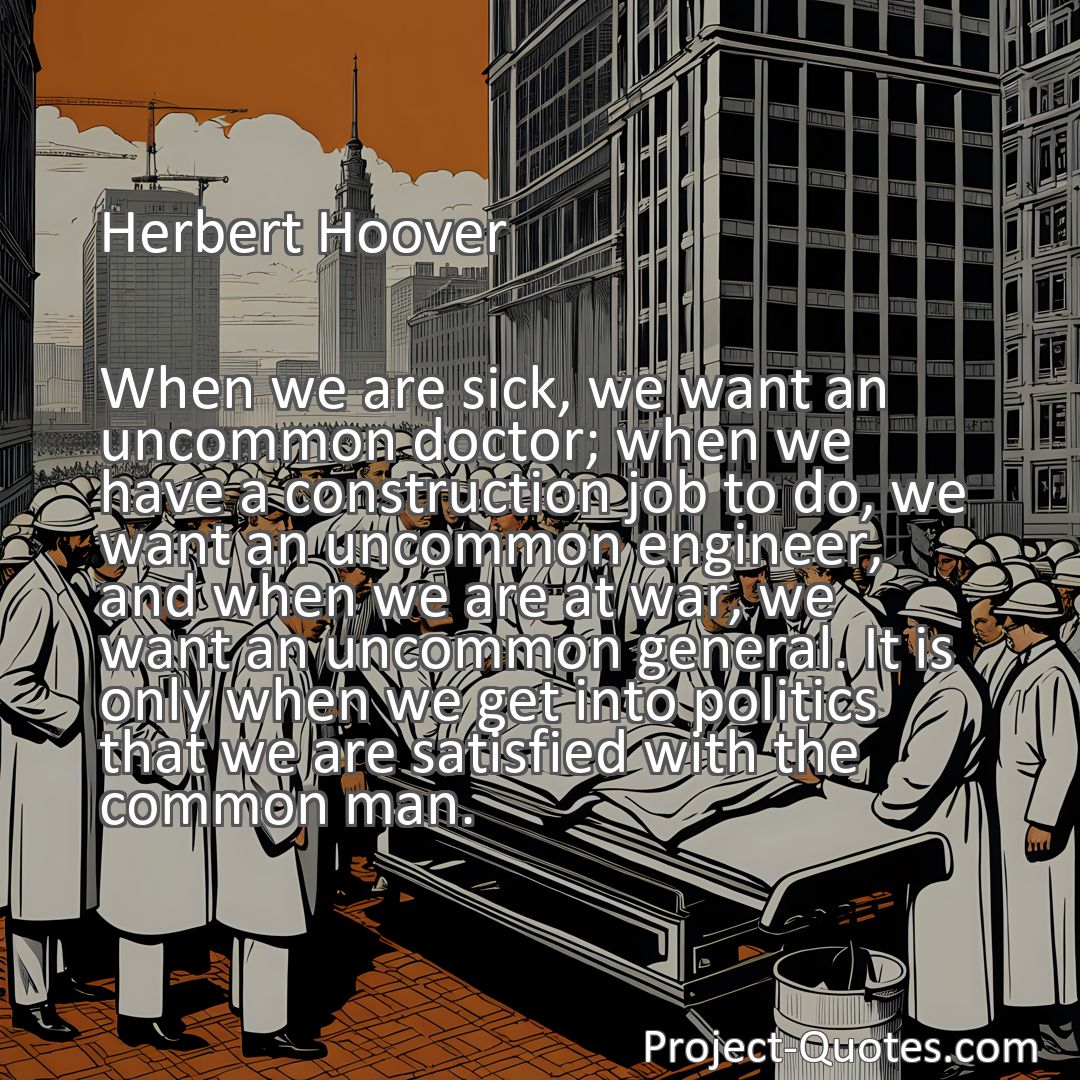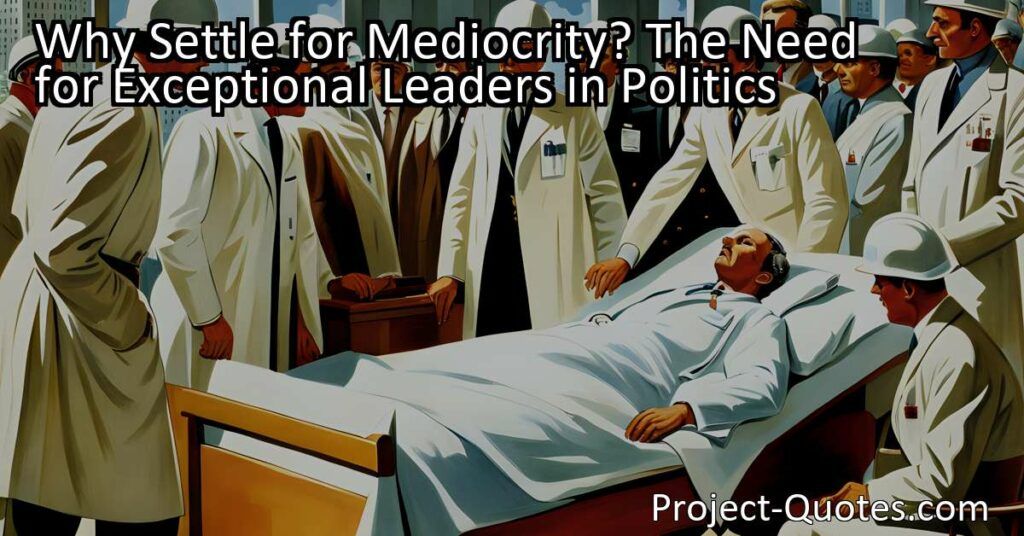When we are sick, we want an uncommon doctor; when we have a construction job to do, we want an uncommon engineer, and when we are at war, we want an uncommon general. It is only when we get into politics that we are satisfied with the common man.
Herbert Hoover
In politics, we often settle for ordinary leaders, but shouldn’t we be striving for exceptional ones? Just like we seek out exceptional doctors, engineers, and generals, we should demand the same level of skill, knowledge, and vision from our political leaders. By prioritizing education, promoting transparency, and encouraging diversity, we can work towards a society guided by exceptional political leaders who are dedicated to the collective welfare and progressive change.
Table of Contents
- 1 When we are sick, we want an uncommon doctor; when we have a construction job to do, we want an uncommon engineer, and when we are at war, we want an uncommon general. It is only when we get into politics that we are satisfied with the common man.
- 2 Herbert Hoover
- 3 Meaning of Quote – When we are sick, we want an uncommon doctor; when we have a construction job to do, we want an uncommon engineer, and when we are at war, we want an uncommon general. It is only when we get into politics that we are satisfied with the common man.
- 4 Freely Shareable Quote Image
- 5 Related
Meaning of Quote – When we are sick, we want an uncommon doctor; when we have a construction job to do, we want an uncommon engineer, and when we are at war, we want an uncommon general. It is only when we get into politics that we are satisfied with the common man.
In life, we often seek out individuals who possess unique skills and qualities to help us in various situations. When we are unwell, we prefer to consult an exceptional doctor who can provide us with the best care and treatment possible. Similarly, when we have construction work to complete, we rely on the expertise of an uncommon engineer who can ensure the safety and efficiency of the project. And when facing the daunting challenge of war, we look for an uncommon general who can strategize and lead us to victory. However, it is puzzling that when it comes to politics, we settle for the ordinary, the common man.
Politics, by definition, revolves around the governance of a society, dealing with important matters that affect every individual’s life. It seems counterintuitive that we would be content with mediocrity in such a crucial aspect of our lives. Shouldn’t we be striving for excellence and seeking out leaders who possess exceptional skills, knowledge, and vision? Yet, often, we find ourselves accepting the status quo and settling for leaders who may not exhibit the qualities necessary to navigate the complexities of politics.
One possible explanation for this phenomenon is the perception of politics as a realm separate from other professions. While we value expertise and uniqueness in fields like medicine, engineering, and military leadership, we may view politics as a domain where anyone can participate, regardless of their qualifications or capabilities. This perception, however, is flawed and can have detrimental effects on the quality of governance.
In truth, politics requires a diverse set of skills and attributes that go beyond mere charisma or popularity. A successful politician should possess strong analytical and critical thinking abilities to assess complex issues and formulate effective policies. They should be able to communicate clearly and persuasively, engaging with diverse constituencies and inspiring confidence in their leadership. Furthermore, a politician must possess a deep understanding of history, economics, and sociology to comprehend the intricacies of societal challenges and propose viable solutions.
Sadly, the current political landscape often lacks individuals who exhibit these exceptional qualities. Instead, we witness a prevalence of candidates who rely on populist rhetoric or empty promises, rather than presenting concrete plans backed by thorough analysis and an in-depth understanding of the issues at hand. This discrepancy between what we seek in other professions and what we accept in politics highlights a significant gap in our approach to selecting and supporting political leaders.
One contributing factor to the perpetuation of this trend may lie in the role of money and influence in politics. Elections and campaigns require substantial funding, and frequently, candidates with substantial financial backing are seen as more viable. This reliance on financial resources not only limits the pool of potential candidates to those with access to wealth but also creates an environment where fundraising prowess is often valued more than genuine expertise or leadership skills. As a result, uncommon individuals who may possess the qualities needed to excel in politics are easily overlooked or overshadowed by those with greater financial backing but less exceptional abilities.
Moreover, the common man’s satisfaction with ordinary leaders may also stem from a lack of awareness or exposure to alternative options. Many individuals rely on mainstream media sources, which often prioritize sensationalism or simplify complex political issues, rather than engaging in comprehensive and critical analysis of candidates’ capabilities. Additionally, limited civic education or opportunities to participate in the political process can contribute to a lack of understanding of what makes an exceptional leader, further perpetuating the satisfaction with common politicians.
To address this prevailing issue, it is essential to prioritize a shift in societal attitudes and expectations regarding political leadership. We must recognize that, like any other profession, politics requires exceptional individuals who possess the skills, knowledge, and dedication necessary to govern effectively. This recognition can begin by encouraging students in schools to actively engage in the study of political science, history, and critical thinking. By fostering a deeper understanding of the complexities involved in politics, we can equip the next generation with the tools necessary to identify and support exceptional leaders.
Furthermore, efforts to increase transparency and reduce the influence of money in politics are crucial. By implementing campaign finance reforms and promoting public funding for candidates, we can level the playing field and enable individuals with exceptional qualities to enter the political arena. Additionally, promoting diversity in politics, including gender, race, and socioeconomic background, is vital to ensure a range of perspectives and experiences are represented, fostering more creative and effective solutions to societal challenges.
Ultimately, we must challenge the notion that the common man is sufficient in politics. We deserve leaders who exhibit exceptional qualities, just as we expect exceptional doctors, engineers, and generals. By holding our political leaders to a higher standard, we can strive for a society where governance is guided by expertise, vision, and a commitment to the collective welfare. Only by valuing and supporting the uncommon in politics can we truly progress and build a better future.
I hope this quote inspired image brings you hope and peace. Share it with someone who needs it today!


